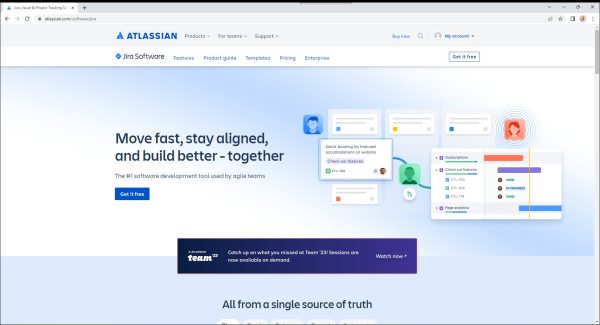Developed by Atlassian, Jira is a commercial issue tracking tool that allows bug tracking and Agile project management. It is one of the most-widely used tool by Scrum teams working in corporate Agile software development environments.
Jira has an open architecture and its features are extended by plugins and add-ons created by third party organizations. A plugin (also known as add-on) is a bundle of code, resources and configuration files that can be dropped into an Atlassian product to add new functionality or change the behavior of existing features. It might add a single feature, like a report, or it might provide enough features to constitute a product in its own right. This article presents some open source Jira plugins, add-ons and utilities that can be found on GitHub.
Updates
October 10 2024
* Added: JiraPS, Terjira, GitHub For Jira, GitHub For Jira

* GitHub For Jira
GitHub For Jira is an open-source project, built and maintained by Atlassian. It allows integrating your GitHub code with your project management in Jira. A separate Jira subscription is required. With two of your most important tools connected, you’ll spend less time managing projects and more time working on them.
When a workflow (e.g. GitHub Action), development event (e.g. pull request, commit, branch) or security event (e.g. dependabot, code scanning or secret scanning alert) runs, the app receives a webhook from GitHub. For development information the app then extracts the issue key from the respective branch/commit/PR and send this information to Jira, for security alerts no issue keys are needed.
GitHub For Jira is designed to backfill historical data into Jira. Once you have installed and configured the app successfully, it will automatically trigger the backfilling process, for 6 months, for the allowed repositories to update Jira with historical information such as pull requests, deployments, branches, builds, commits and security alerts. Once the initial backfilling process is complete, you will be able to view the backfilled date and status on the user interface.
All branches will be backfilled, regardless of their creation date. However, pull requests, deployments, builds, commits and security alerts will only be backfilled for the last six months. If you wish to pull more historical data in Jira, you may continue the backfill process for older dates by selecting ‘Continue backfill’ from the action menu. If the historical data is substantial, we recommend backfilling your data in 6 month segments, and continuing the process until you’ve reached the desired backfilled date.
Website: https://github.com/atlassian/github-for-jira
* Jira Issue Copy
Jira-issue-copy is an open source utility to clone JIRA issues from one project to another. Certifications like ISO or CMMI require that you have control over the issues your team works on, but for confidentiality or cost issues you can’t add everyone to your client’s JIRA. Also you may want to work internally and not disclose everything you discuss with your team to your client. In that context it is often needed to clone issues from their JIRA to yours. This utility allows you to do that, moving descriptions, issue name (adding the client’s key to it), attachments and comments to your JIRA.
Website: https://github.com/nedd0/jira-issue-copy
* JiraCLI
JiraCLI is an interactive command line tool for Atlassian Jira that will help you avoid Jira UI to some extent. This tool may not be able to do everything, but it has all the essential features required to improve your day-to-day workflow with Jira. This tool includes all necessary features like issue creation, cloning, linking, ticket transition, and much more. Note that some features might work slightly differently in cloud installation versus on-premise installation due to the nature of the data. Yet, the creators have attempted to make the experience as similar as possible.
Website: https://github.com/ankitpokhrel/jira-cli
* JiraPS
JiraPS is an open source Windows PowerShell module to interact with Atlassian JIRA via a REST API, while maintaining a consistent PowerShell look and feel.
Website: https://github.com/AtlassianPS/JiraPS
* Jira Dependency Graph
Jira Dependency Graph is an open source tool that allows visualizing dependencies between JIRA tickets. It takes into account subtasks and issue links. It uses JIRA rest API v2 for fetching information on issues. Uses Google Chart API for graphical presentation.
Website: https://github.com/pawelrychlik/jira-dependency-graph
* Jira Lens
Jira-Lens is a Python Based vulnerability Scanner for JIRA. Jira is a proprietary issue tracking product developed by Atlassian that allows bug tracking and agile project management. This tool Performs 25+ Checks including CVE’s and Multiple Disclosures on the Provided JIRA Instance.
Website: https://github.com/MayankPandey01/Jira-Lens
* Jira Dashboard
Jira Dashboard is an open source tool to create your own team dashboard with custom widgets. Built with Next.js, React, styled-components and polished. It can import data from Jira like Sprint Days Remaining.
Website: https://github.com/danielbayerlein/dashboard
* Jira Python Library
Jira Python Library is an open source library that aims to ease the use of the Jira REST API from Python and it has been used in production for years.
Website: https://github.com/pycontribs/jira
* JavaScript JIRA API for node.js
JavaScript JIRA API for node.js is a node.js module, which provides an object-oriented wrapper for the Jira Rest API
Website: https://github.com/jira-node/node-jira-client
* Metasearch
Metasearch is an open source search tool for searching many other tools in parallel. You can use it for Jira, Slack, Google Docs, GitHub, and more
Website: https://github.com/duolingo/metasearch
* Terjira
Terjira is an interactive and easy to use command line interface (or Application) for Jira. You do not need to remember the resource key or id. Terjira suggests it with an interactive prompt. Your Jira must support Rest API 2.0 and Agile Rest API 1.0.


